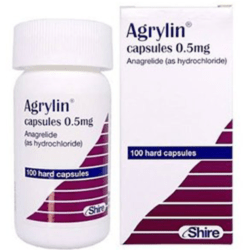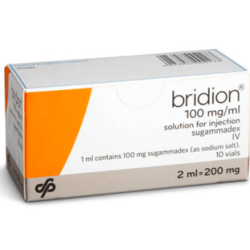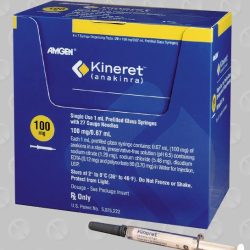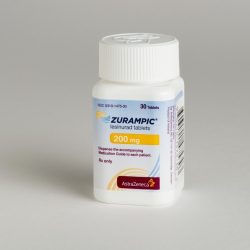Description
Anagrelide Medication
Anagrelide Capsules are used for the treatment of patients with thrombocythemia, secondary to myeloproliferative neoplasms, to reduce the elevated platelet count and the risk of thrombosis and to ameliorate associated symptoms including thrombo-hemorrhagic events.
Dosage: The recommended starting dosage of anagrelide hydrochloride for adult patients is 0.5 mg for the four times in a day or 1mg twice daily. Pediatric Patients: The recommended starting dosage is 0.5 mg daily.
Titration: Take the starting dosage for at least 7 days and then titrate in order to reduce as well as maintain the platelet count below 600,000/µL, and ideally between 150,000/µL & 400,000/µL. The increment of doses should not exceed 0.5 mg/day in any 1 week. The anagrelide dosage may not be exceeded 10 mg/day or 2.5 mg in a single dose. Most patients have an adequate response at a dose of 1.5-3.0 mg/day.
Side Effects: The most commonly reported anagrelide side effects are:
- Back pain
- Cough
- Headache
- Diarrhea
- Fatigue
- Fever
- Gas
- Malaise
- Nausea
- Sore throat
- Tingling
- Vomiting
- Abdominal pain
- Loss of appetite
- Digestive problems
- Whirling sensation
- Redness and itching of skin
Storage: Store the anagrelide hydrochloride capsules at 25°C (77°F); excursions permitted to 15-30°C (59-86°F). Always store anagrelide capsules in a light resistant container.
Availability in India: The Indian Pharma helps in order to connect buyers with suppliers who can ship anagrelide across the world as per the buyer’s requirement. The Indian Pharma provides guarantee of quality & delivery for the Anagrelide Capsules.
Buying Procedure: In order to buy anagrelide, you can contact us at our Toll-free number 1800 889 1064 or on WhatsApp +919310090915 or an Email to us at: info@theindianpharma.com along with the legitimate ID Proof, standard Prescription and Medical Reports.
Conclusion: Findings suggest that anagrelide treatment should become a useful agent in order to control the thrombocythemia seen in chronic myeloproliferative diseases and may be effective in those patients in whom the treatment with currently existing agents has failed.

